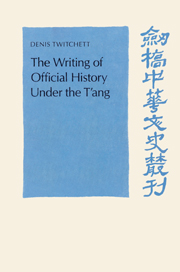Book contents
- Frontmatter
- Contents
- Preface
- Conventions
- List of abbreviations
- Part I The bureaucratic apparatus
- Part II The compilation of the historical record
- 3 Introduction
- 4 The Court Diaries (Ch'i-chü chu)
- 5 The Inner Palace Diary (Nei Ch'i-chü chu)
- 6 The Record of Administrative Affairs (Shih-cheng chi)
- 7 The Daily Calendar (Jih-li)
- 8 Biographies
- 9 Histories of institutions, historical encyclopedias, and collections of documents
- 10 The Veritable Records (Shih-lu)
- 11 The National History (Kuo shih)
- Part III The Chiu T'ang shu
- Appendix: Derivation of the Basic Annals chapters of Chiu T'ang shu
- Bibliography
- Index
7 - The Daily Calendar (Jih-li)
Published online by Cambridge University Press: 03 November 2009
- Frontmatter
- Contents
- Preface
- Conventions
- List of abbreviations
- Part I The bureaucratic apparatus
- Part II The compilation of the historical record
- 3 Introduction
- 4 The Court Diaries (Ch'i-chü chu)
- 5 The Inner Palace Diary (Nei Ch'i-chü chu)
- 6 The Record of Administrative Affairs (Shih-cheng chi)
- 7 The Daily Calendar (Jih-li)
- 8 Biographies
- 9 Histories of institutions, historical encyclopedias, and collections of documents
- 10 The Veritable Records (Shih-lu)
- 11 The National History (Kuo shih)
- Part III The Chiu T'ang shu
- Appendix: Derivation of the Basic Annals chapters of Chiu T'ang shu
- Bibliography
- Index
Summary
The Daily Calendar (Jih-li) was a chronological record prepared as a first stage in correlating and combining into a single work the information from the Court Diary, the Record of Administrative Affairs, and other sources previously mentioned, in preparation for the eventual compilation of the definitive Veritable Record of each reign. The compilation of this type of Daily Calendar was, however, a late development, having been begun only in 805, following a suggestion by the then director of the National History, Wei Chih-i.
We know little about the official Jih-li although a small part of that for the T'ien-yu period (904–7), the T'ien-yu jih-li, survived into the Southern Sung. Those of the reigns from Hsiuan-tsung on seem to have been lost early on. When in 891, after the Huang Ch'ao rebellion, P'ei T'ing-yü was ordered to compile the Veritable Records for Hsiuan-tsung's reign, “not a single character survived of the Ch'i-chü chu and Jih-li of the preceding forty years.”
The question of the Daily Calendar is further complicated by the existence of a number of private works with the same title, Jih-li or the title “Calendar,” li. A work that was apparently representative of this genre and was very widely read among the official class in the mid ninth century was the Chiang-shih Jih-li written by Chiang I (747-821), a compiler in the Historiographical Office under Te-tsung and Hsientsung. This was subsequently continued by his sons Chiang Hsi and Chiang Shen, who were also in turn appointed as official historians.
- Type
- Chapter
- Information
- The Writing of Official History under the T'ang , pp. 57 - 61Publisher: Cambridge University PressPrint publication year: 1992



